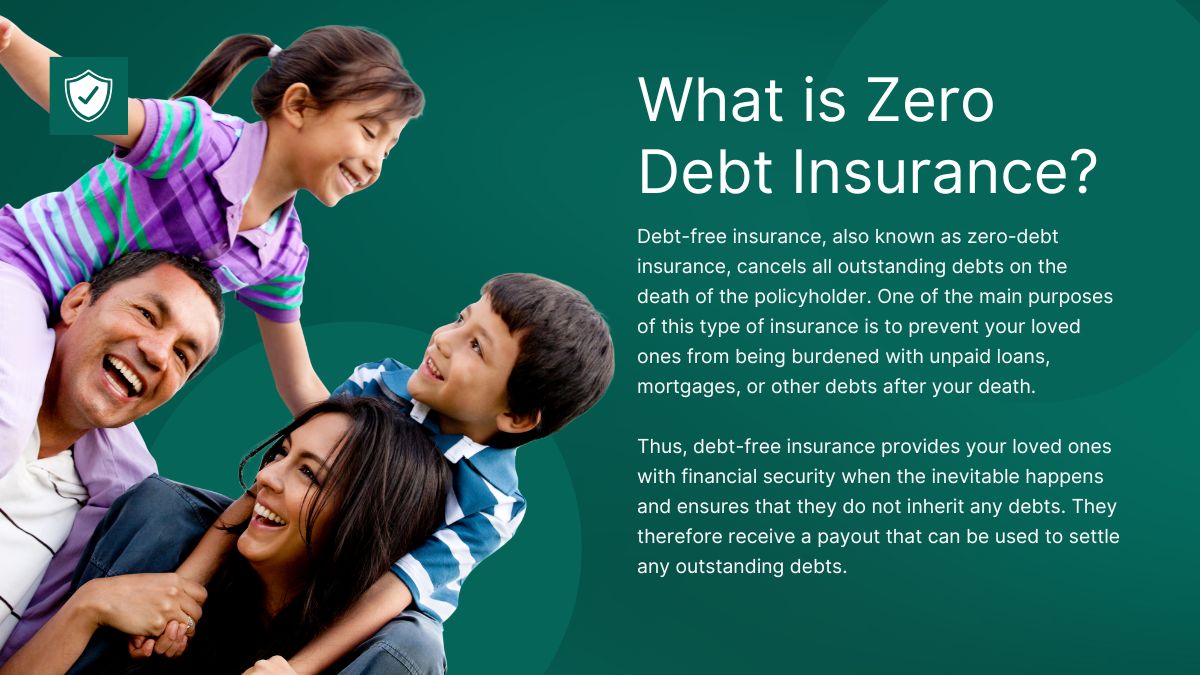A new concept is slowly conquering the insurance world – zero-debt insurance. In recent years, it has become increasingly popular among those who want to protect themselves financially without having to burden themselves with outstanding debts. But what does zero-debt insurance actually mean? What is it, and why should you consider it for your financial planning? I’ll explain it to you in simple terms.
What is Zero Debt Insurance?

Debt-free insurance, also known as zero-debt insurance, cancels all outstanding debts on the death of the policyholder. One of the main purposes of this type of insurance is to prevent your loved ones from being burdened with unpaid loans, mortgages, or other debts after your death.
Thus, debt-free insurance provides your loved ones with financial security when the inevitable happens and ensures that they do not inherit any debts. They therefore receive a payout that can be used to settle any outstanding debts.
How Zero Debt Insurance Works?
The operating principle of debt-free insurance is very simple. You take out a life insurance policy with a certain amount of coverage, and if you die during the term of the policy, the insurer uses the payout to settle all outstanding debts. Here you can see how it works in detail:
- Life insurance cover: Zero debt-free insurance is usually a life insurance policy—either term life or whole life insurance. The amount of cover you choose depends on the amount of debt you want to cover.
- Debt settlement: In the event of your death, the insurance company will use the payout to pay off any remaining debts, including personal loans, mortgages, credit card balances, or student loans.
- Beneficiaries: Once debts are settled, any remaining funds from the insurance payout will go to your beneficiaries, such as your spouse, children, or loved ones. This can provide them with financial stability and peace of mind.
Types of Zero Debt Insurance
Zero debt insurance can come in different forms, depending on your financial needs and goals:
- Term life insurance: This is the simplest form of life insurance where you pay premiums for a set period of time. If you die during this time, your beneficiaries will receive a payout. You can opt for a term that matches the length of your debt (e.g. a 20-year term if you have a 20-year mortgage).
- Whole life insurance: Unlike term life insurance, whole life insurance provides lifetime coverage and also accumulates cash value over time. This type of insurance can be especially useful if you have long-term debt or want to build up savings in addition to covering debt.
- Mortgage life insurance: This is life insurance specifically designed to cover your mortgage in the event of your death. It ensures that your family does not have to worry about losing their home due to unpaid mortgage debts.
Why Should You Consider Zero Debt Insurance?
- Peace of mind for your family: The main reason for taking out residual debt insurance is to protect your loved ones from the financial burden of debt after your death. If you have large debts, such as a mortgage, student loan, or credit card balance, debt-free insurance can give your family peace of mind by cancelling these debts.
- Protects your assets: In some cases, your assets may be at risk if you die and leave behind large debt. A debt-free insurance policy ensures that your property, such as your home, remains in the hands of your family and is not taken away by creditors.
- Avoiding bankruptcy: Without zero debt protection insurance, your family may be faced with the difficult decision of paying off your outstanding debts, which could drive them into financial hardship or even bankruptcy. The life insurance payout can act as a financial shield and help them avoid this scenario.
- Simplified Financial Planning: Zero-debt insurance is a great addition to your overall financial plan. It ensures that your estate planning and financial goals are in line with your debt repayment strategy. This makes it easier for you to ensure that your family is financially secure in the event of an untimely death.
Important Considerations Before Deciding in Favour of Zero Debt Insurance
- Amount of cover: Be sure to calculate the total debt you currently have — including mortgages, personal loans and other financial commitments. You should choose a policy with a level of cover that fully covers your debts.
- Affordability: As with any insurance policy, you need to make sure you can afford the premiums. While zero debt-free insurance offers great benefits, it can also come with a higher premium, especially if you are covering large debts. Weigh the costs against the benefits to determine if it fits into your budget.
- Exclusions: Like all insurance policies, debt-free insurance may come with certain exclusions or conditions. For example, some policies do not cover certain types of debts, such as certain business-related debts. Always read the small print before taking out a policy.
- Policy terms and conditions: Make sure you understand the terms of your policy, such as the payout process, eligibility requirements, and the timeframe for debt settlement. Be sure to discuss these aspects with your insurance provider.
Zero Debt Insurance vs. Regular Life Insurance
You may be wondering how zero-debt insurance differs from normal life insurance. While the basic principle is the same—the payment of a lump sum to the beneficiaries in the event of death — the key difference lies in the way the payout is used.
- Regular life insurance: The payout from a regular life insurance policy can be used by the beneficiaries for any purpose. It can be used to cover daily expenses, education costs, or even savings. However, the payout is not automatically used to pay off debts.
- Zero Debt Insurance: As mentioned earlier, the main objective of zero debt insurance is to settle all outstanding debts first. After the debts are settled, the remaining funds are passed on to your beneficiaries.
Read more:
- 5 Questions to Ask Before Taking a Personal Loan
- 9 Proven Ways to Pay Off Debt Faster and Stress Less About Money
What is Zero Debt Insurance for Bike?
Zero-depreciation insurance for bikes is supplementary insurance that eliminates the depreciation factor when calculating insurance claims. This means that if your bike is damaged in an accident, you will receive the full cost of repairing or replacing parts such as plastic, rubber, and fibreglass, with no deductions for depreciation.
This is beneficial as the value of these parts depreciates over time and without this insurance, you would have to pay for the loss in value out of your own pocket.
No depreciation insurance is particularly useful for new motorbikes or those with expensive spare parts, as it ensures you receive the maximum amount of compensation and minimises your out-of-pocket expenses for repairs. Please note that this is an additional insurance to your regular bike insurance, for which you will have to pay an additional premium.
What is Zero Debt Car Insurance?
Zero Depreciation Car Insurance is an optional add-on to your standard car insurance. It eliminates the depreciation factor when calculating insurance claims for certain parts. If your car is damaged in an accident, the insurance company usually deducts the value of parts such as rubber, plastic and fibreglass before settling the claim.
With Zero Depreciation, you get the full cost of repairing or replacing these parts, regardless of their age or wear and tear. This is particularly beneficial for new cars or those with expensive parts as it minimises your outlay on repairs.
How to Claim Zero Debt Car Insurance?
To apply for car insurance without depreciation, follow these general steps:
- Notify your insurer: Immediately inform your insurance company of the accident or incident that caused the damage to your car.
- Submit a claim: Submit a claim form to your insurer, giving all the necessary details about the incident, such as date, time, location and any witnesses.
- Have your car inspected: Take your car to an authorised garage for an inspection and get a detailed estimate for the repair.
- Submit the required documents: Submit the repair estimate along with other required documents such as driving licence, registration certificate and FIR (if applicable) to your insurance company.
- Claim processing: The insurance company will review your claim and the repair estimate. If the claim is approved, it will make the payment directly to the repairer or reimburse you.
How Many Times Zero Debt Insurance Can Be Claimed?
The number of cases in which you can claim car insurance without loss of value within an insurance year is usually limited. This limit is usually stated in your insurance documents.
- Joint limit: Many insurers allow two claims within an insurance year under zero depreciation cover.
- Policy Variations: Some insurers offer options for a higher claim limit, such as three or even unlimited claims, but these usually come with a higher premium.
It’s important to carefully review your policy documents to understand the specific claim limits and any applicable terms and conditions for your no diminished value car insurance.
Disclaimer: This information is for general information and guidance only. For specific details and coverage, please refer to your policy documents or contact your insurance provider.
Final Thoughts
Payment protection insurance can be an invaluable tool in your financial armoury, giving you peace of mind and ensuring that your loved ones are not faced with financial burdens after your death. It is an excellent option for anyone who has large debts and wants to provide financial security for their family.
If you are considering zero debt protection insurance, you should take the time to assess your debts, choose the right cover and ensure you are prepared for the future.
If you’re unsure whether debt-free insurance is the right choice for you, a financial advisor can help you make an informed decision tailored to your specific situation.

